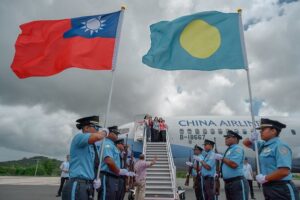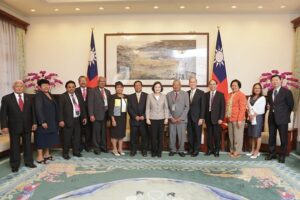Taiwan and Palau – Recognition’s Many Facets
The tiny Pacific nation of Palau caught headlines when it co-hosted the seventh “Our Ocean Conference” in mid-April this year. For Palau’s president, Surangel Whipps Jr, the hybrid gathering certainly was a moment of pride. In many ways, the discussions held finally focused on the Pacific Islands’ real concerns – the foreseeable impact of climate change and rising sea levels, among others, on islanders’ lives. With all eyes notably set on Palau’s National Gym to follow lively debates, the simultaneous presence of a Taiwan Coast Guard vessel went largely unnoticed. After all, bilateral relations between Taiwan and Palau have been perennial even in the face of geopolitical shifts – including the Sino-Solomon Islands security pact and a heated Australian election campaign. And, as Whipps has made repeatedly clear, “nobody dictates our [Palau’s] friends” – ultimately begging the question of what underlying factors are at play in Palau’s recognition of Taiwan’s statehood.

Image: Taiwan’s President Tsai Ing-wen bidding farewell at the airport of Palau during her Maritime Democracy Tour, March 2019 (Source: Makoto Lin, Office of the President https://flic.kr/p/Rx95ck)
To begin with, Palau’s relations with Taiwan need to be considered against the backdrop of its relationship with the U.S. Being a fully sovereign nation in free association with Washington since 1994, Palau is granted access to the U.S.’s defence umbrella and social services as well as financial assistance for a period of 15 years. Since the passing of the TAIPEI Act in Washington in 2020, however, the Compact of Free Association (COFA) has become a tool of geopolitical significance. The Taiwan Allies International Protection and Enhancement Initiative (TAIPEI) Act, passed under the Trump administration, effectively supplements the original 1979 Taiwan Relations Act. Following persistently deteriorating relations between China and the U.S., Washington started to swiftly edge closer to Taiwan, allowing for the passage of the Taiwan Travel Act in 2018 and facilitating bilateral official exchanges on U.S. soil. Whereas previously the COFA had partially lost its intended meaning following the end of the Cold War, the U.S.’s shift in policy vis-à-vis Taiwan now acts as a cohesive between Palau, Taiwan, and the U.S. After all, the U.S. ambassador to Palau, was the first senior diplomatic envoy to visit Taipei, together with Whipps.
Nevertheless, the COFA in combination with the TAIPEI Act should not be seen as a mere top-down means of control employed by Washington to serve its own security interests and to preserve Taiwan’s diplomatic space. Indeed, it appears that the legislation has had the positive side effect of elevating Palau’s status and allowing for the island nation to leverage both Washington’s and Taipei’s concerns to its advantage. Whipps has time and again reiterated his predecessor’s offer to host more U.S. soldiers, fully realizing the geopolitical potential of Palau’s geography. While this definitely serves American security interests and implicitly bolsters Taiwan’s defence, Whipps did not conceal that more stationed soldiers could offer some relief for the ailing post-Covid economy.
Yet, if anything, the pandemic’s devastating consequences had the surprisingly positive effect of visualizing what motivates the mutual diplomatic recognition between Palau and Taiwan beyond the realm of great power politics. Initial unofficial contacts and financial assistance kickstarted relations but only truly flourished when Palau extended full diplomatic recognition in 1999. Then-president Kuniwo Nakamura tied the knot with Taipei shortly after signing the COFA agreement with Washington in an effort to expand Palau’s diplomatic clout post-independence. A recently revealed statue of Nakamura in Palau’s Peleliu state and donated by the Taiwanese government now stands symbolical for his personal efforts paving the way to officialise ties between the two islands. Ultimately culminating in the first Taiwan-Pacific Allies summit, Nakamura thereby not only bolstered his nation’s national interests but inadvertently supported Taiwan’s aim to regain recognition among the international community.

Image: Taiwan’s President Tsai Ing-wen posing with former Palauan President Tommy E. Remengesau Jr. in 2016 (Source: Taiwan Presidential Office; https://flic.kr/p/Hkojq7)
Taiwan has since been able to consolidate its ties with Palau by expanding diplomatic efforts on the ground in the form of targeted economic assistance. Even though Taiwanese developmental aid funds pale in comparison to Chinese funds for the region, the small-scale approach has arguably been highly effective. The International Cooperation and Development Fund (ICDF), manages niche development projects, primarily in horticulture and aquaculture in the case of Palau. These projects are targeted at building local capacities in the long-term, either through material or financial donations or through educational opportunities, such as Mandarin classes or expert workshops. Tellingly, the Taiwanese side recently resumed Mandarin high school classes to be held remotely due to ongoing restrictions. The move once again underscored just how important continuity and foresight are for both sides.
These seemingly miniscule Taiwanese efforts, in addition to being far more manageable than larger projects, directly tap the Palauan government’s goal to increase his nation’s self-sufficiency. Besides avoiding unnecessary hiccups for the rather fragile island economy, it seems unequivocable that this bottom-up strategy works best to maintain bilateral relations “through thick and thin.”
This last element appears particularly imperative for the Palau-Taiwan connection. Diplomatic recognition and supporting Taiwan’s claims to statehood in the case of Palau, invariably requires long-term commitment. The Covid-19 pandemic and the ensuing health care difficulties have proven particularly enlightening. While Taiwan’s Covid-19 diplomacy certainly also aimed at showing off its ability to act swiftly, for Palau it was the swift response that made the difference. Apart from quickly providing Palau with medical and personal protective equipment, the Taiwanese embassy unveiled a considerably generous stimulus package in March 2022. Jessica Lee, Taiwan’s diplomatic envoy in Koror, in her speech, reiterated the need to “boost the local economy,” and to “promote people’s quality of life.”
Perhaps the strongest signal that Palau is able to send in support of Taiwan’s statehood is via international organizations. Just days ahead of this year’s 75th World Health Assembly (WHA), Palau was among the thirteen remaining diplomatic allies, in addition to U.S. calls, that advocated for Taipei’s inclusion in the Geneva get-together. Although a formal invitation is still pending and it is highly likely that China will veto Taiwan’s participation, such lobbying efforts go beyond overt symbolism.
For Palau, it offers an opportunity to reaffirm its own nationhood unhindered, voicing concerns, and calling for collective action. An act that the island nation had not been granted prior to gaining independence in 1994. A sentiment that is, of course, also shared by Taiwanese officials. More importantly, however, it presents a strong counter-narrative to China’s claims to Taiwan.
Although not entirely uncontroversial, the political and economic bond is now increasingly supplemented by a narrative of common cultural and historical roots that underpin Taiwan-Palau relations. Often referred to as a mutual “Austronesia heritage,” this element of the Taiwan-Palau connection has become particularly pronounced with Tsai Ing-wen taking up office in 2016. Following a ten-year hiatus, Taiwan’s president brought back the “Austronesian Forum” in 2018, an annual get-together of political leaders and cultural envoys from the linguistically close islands that make up “Austronesia.” Palau had been the first Pacific nation to not only host the inaugural meeting but also house the headquarters of its secretariat since its establishment. In hindsight, Palau played a critical role in advocating for, and actively walking the walk on, recognizing Taiwanese statehood. A fact that current president Whipps regularly reinvokes as a symbol of Palauan resolve and courage in the face of foreign pressures.
In fact, the thick web that makes up Palau’s embrace and diplomatic recognition of Taiwan appears ever more undeterred by geopolitical pressures these days. After all, at this point, it appears safe to say that China is actively squeezing Taipei on the diplomatic front whenever possible. And up until now, Beijing’s attempts have proven unsuccessful, at least in the case of Palau. The long-term benefits of recognizing Taipei simply outweigh the costs and risks of establishing diplomatic relations with China. At least for now, it is not in Palau’s own interest to sever ties at this point in time.
Author: Larissa Stünkel






